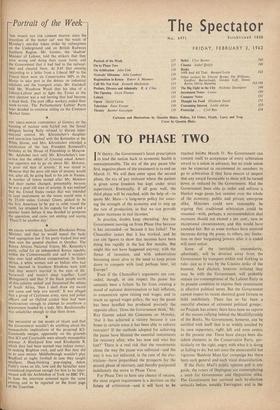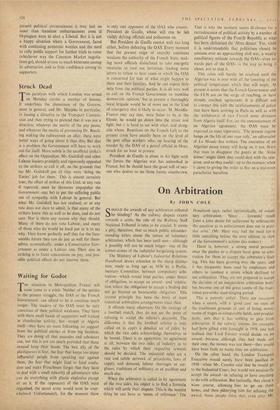ON TO PHASE TWO
IN theory, the Government's latest prescription to lead the nation back to economic health is unexceptionable. The era of the pay pause (the first, negative phase of the treatment) is to end on March 31. We will then enter upon the second phase, the era of pay restraint where the patient is given some freedom but kept under strict supervision. Eventually, if all goes well, the third phase will be reached, with the help of—to quote Mr. Hare—`a long-term policy for assur- ing the strength of the economy and to step up the rate of production, so that we can provide greater increases in real incomes.'
In practice, doubts keep obtruding. Are the Government moving on from Phase One because it has succeeded—or because it has failed? The Chancellor insists that it has worked, and he can cite figures to show that incomes have been rising less rapidly in the last few months. But might this not have happened anyway, with the threat of recession, and with industrialists becoming more alive to the need to keep prices down to compete with (and perhaps later, in) Europe?
Even if the Chancellor's arguments are con- ceded, though, in one respect the pause has certainly been a failure. So far from creating a mood of national determination to halt inflation, to concentrate upon raising real wages, and to reach an agreed wages policy, the way the pause has been handled has produced precisely the opposite effect. 'Does the Government think,' Mr. Ray Gunter asked the Commons on Monday, `that it has achieved a victory because it can boast in certain areas it has been able to enforce restraint? If the methods adopted for achieving the pause have blunted the essential instruments for recovery after, who has won and who has lost?' There is a real risk that the resentments about the way the pause was enforced—and the way it was not enforced, in the case of the elec- tricians—have jeopardised the prospects for the second phase of recovery, and thereby postponed indefinitely the move to Phase Three.
For Phase Two to have any chance of success, the most urgent requirement is a decision on the future of arbitration—and it will have to be reached before March 31. No Government can commit itself to acceptance of every arbitration award to a union in advance; but no trade union can be expected to recommend its members to go to arbitration if they have reason to suspect that any award favourable to them will be turned down or reduced by the Government. Had the Government been able to order and enforce a. blanket wage pause last summer over the whole of the economy, public and private enterprise alike, Ministers could now reasonably be arguing that traditional arbitration could be resumed—with, perhaps, a recommendation that increases should not exceed x per cent., save in exceptional circumstances; and this would have sounded fair. But as some workers have received increases during the pause, to others, any limita- tion on their bargaining powers after it is ended will seem unfair.
Some of the inevitable unpopularity, admittedly, will be diverted away from the Government by transport strikes and working to rule—just as it was by the Cousins strike of the busmen. And electors, however irritated they may be with the Government, will probably remain too contemptuous of the Labour Party in its present condition to express their resentments in effective political terms. But the Government cannot expect its recent electoral good fortune to hold indefinitely. There has so far been a merciful absence of extremist political groups: no Poujade has arisen; there have been no reports of the masses rallying behind the MacGillycuddy of the Reeks. No Government, however, can be satisfied with itself that is so widely assailed by its own supporters, right, left and even centre, as the present one. There have always been dis- sident elements in the Conservative Party, par- ticularly on the right, angry with what it is doing or failing to do; but not since the unsuccessful but vigorous 'Baldwin Must Go' campaign has there been such general and such vocal dissatisfaction.
If the Daily Mail's public opinion poll is any guide, the voters of Orpington are contemplating a snub for Government and, Opposition alike. The Government has survived such by-election setbacks before, notably Torrington; and in the present political circumstances it may, feel no more than transient embarrassment even if Orpington were to elect a Liberal. But it is not a happy situation where a Government, faced with continuing economic worries and the need to rally public support for further trials to come (whichever way the Common Market negotia- tions go), should arouse so much bitterness among its adversaries, and so little confidence among its supporters.



































 Previous page
Previous page